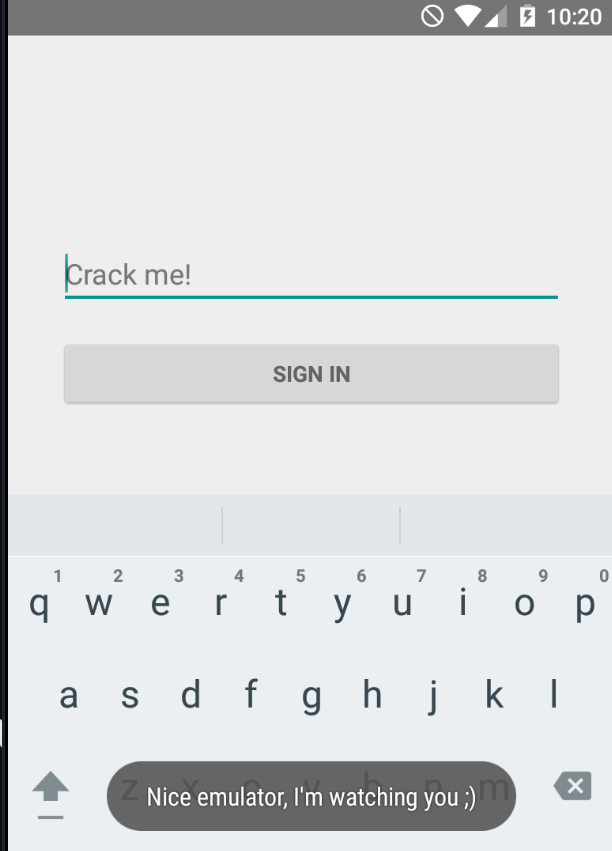Description: John bets nobody can find the passphrase to login!
Note: For this challenge, we need install some things into our Android 5.1 device with Genymotion.
For example, an ARM Translator.
https://github.com/m9rco/Genymotion_ARM_Translation

Install the apk with adb
adb install -r crack-me-if-you-can.apk
Then, decompile it with apktool
apktool d crack-me-if-you-can.apk
We can see the source code with jadx (GUI version).
There are some activities so curious..
In fact, in the MainActivity (LoginActivity) we have an “flag” hardcoded.flagging{It_cannot_be_easier_than_this}
But this is a fake flag.
So, let’s keep reading the code.
Here we have an a method
private boolean a(String str) {
if (!str.equals(c.a(b.a(b.b(b.c(b.d(b.g(b.h(b.e(b.f(b.i(c.c(c.b(c.d(getString(R.string.jadx_deobf_0x00000257)))))))))))))))) {
return false;
}
Toast.makeText(getApplicationContext(), getString(R.string.jadx_deobf_0x0000025b), 1).show();
return true;
}
Where, after some instructions, the string is jadx_deobf_0x00000257 and jadx_deobf_0x0000025b
If we inspect the res/values/strings.xml, these strings in the method are:
<string name="jadx_deobf_0x00000257" formatted="false">[[c%l][c{g}[%{%Mc%spdgj=]T%aat%=O%bRu%sc]c%ti[o%n=Wcs%=No[t=T][hct%=buga[d=As%=W]e=T%ho[u%[%g]h%t[%}%</string>
<string name="jadx_deobf_0x0000025b">Good to go! =)</string>
So, we need the message Good to go!, then we need input the [[c%l][c{g}[%{%Mc%spdgj=]T%aat%=O%bRu%sc]c%ti[o%n=Wcs%=No[t=T][hct%=buga[d=As%=W]e=T%ho[u%[%g]h%t[%}% string in the TextEdit.
But, the string is obfuscated. So, looking more in the code, we can found classes likeb
public class b {
public static String a(String str) {
return str.replace("c", "a");
}
public static String b(String str) {
return str.replace("%", "");
}
public static String c(String str) {
return str.replace("[", "");
}
public static String d(String str) {
return str.replace("]", "");
}
public static String e(String str) {
return str.replaceFirst("\\{", "");
}
public static String f(String str) {
return str.replaceFirst("\\}", "");
}
public static String g(String str) {
return str.replaceFirst("c", "f");
}
public static String h(String str) {
return str.replaceFirst("R", "f");
}
public static String i(String str) {
return str.replace("=", "_");
}
}
And c
package it.polictf2015;
/* loaded from: classes.dex */
public class c {
public static String a(String str) {
return str.replace("aa", "ca");
}
public static String b(String str) {
return str.replace("aat", "his");
}
public static String c(String str) {
return str.replace("buga", "Goo");
}
public static String d(String str) {
return str.replace("spdgj", "yb%e");
}
}
So, we can use this information for craft an python script for make it more easy.
def apply_transformations(text, transformations):
for old, new, count in transformations:
if count is None:
text = text.replace(old, new)
else:
text = text.replace(old, new, count)
return text
def transform_string(input_string):
# Define transformations in order
transformations = [
# Transformations from class c
("spdgj", "yb%e", None), # Replace "spdgj" with "yb%e"
("aat", "his", None), # Replace "aat" with "his"
("buga", "Goo", None), # Replace "buga" with "Goo"
# Transformations from class b
("=", "_", None), # Replace "=" with "_"
("}", "", 1), # Remove the first "}"
("{", "", 1), # Remove the first "{"
("R", "f", 1), # Replace the first "R" with "f"
("c", "f", 1), # Replace the first "c" with "f"
("]", "", None), # Remove all "]"
("[", "", None), # Remove all "["
("%", "", None), # Remove all "%"
("c", "a", None), # Replace all remaining "c" with "a"
# Final transformation from class c
("aa", "ca", None), # Replace "aa" with "ca"
]
# Apply all transformations
result = apply_transformations(input_string, transformations)
return result
# Input string
input_string = '[[c%l][c{g}[%{%Mc%spdgj=]T%aat%=O%bRu%sc]c%ti[o%n=Wcs%=No[t=T][hct%=buga[d=As%=W]e=T%ho[u%[%g]h%t[%}%'
# Apply transformations and print the result
print(transform_string(input_string))
And then, the flag is flag{Maybe_This_Obfuscation_Was_Not_That_Good_As_We_Thought}
Put into the TextEdit and get the Good to go! =) message.
I hope you found it useful (:
Leave a Reply